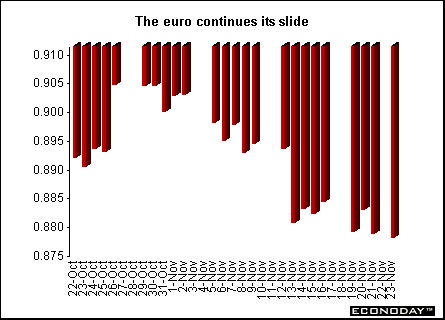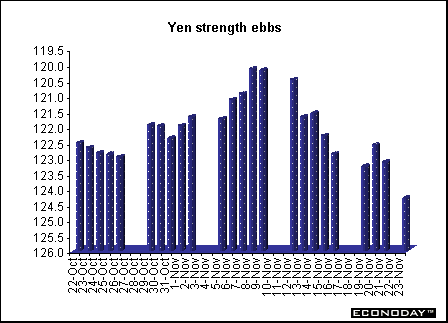
Currencies
The dollar rose to a 15 week high against the euro as investors bet the United States will be the first to recover from the global slump. This raised the appeal of U.S. assets, a key threat to the euro. The Federal Reserve has reduced interest rates 10 times this year and the government is working on a package of tax cuts to boost growth. The European Central Bank has cut rates just four times this year and many investors expect European growth to stall. Gloomy news such as last week's German GDP report, which shrunk in the third quarter after stalling in the second quarter, doesn't help. German business confidence dropped to an eight year low in October, continuing the growing pessimism about the economy, which accounts for about one third of EMU GDP. The dollar has climbed against the euro for six of the past seven weeks.

Changes to Morgan Stanley Capital International Inc.'s global stock indexes, which take place on Friday, November 30, may lessen demand for European equities and in turn hurt the euro. MSCI is shuffling the indexes used as a performance benchmark by about $3 trillion in funds to include companies based on their shares available for trading instead of their full market value. That has increased the overall weighting of British and U.S. companies and cut that of European and Japanese stocks.
The yen dropped for a second week against the U.S. dollar. Bank of Japan board member Shin Nakahara said Thursday the government might increase purchases of foreign government bonds, deepening concern the central bank wants to weaken the currency. Japanese policy makers sold yen over seven days in September to boost the currency value of exporters' earnings prior to the end of the Japanese fiscal half year. Economic gloom pervaded the markets after the government said it expected to record its biggest annual contraction in more than 20 years.



Introduction • Global Stock Market Indexes • Recap of Global Markets • Currencies • Indicator Scoreboard

The Bottom Line • Looking Ahead
|